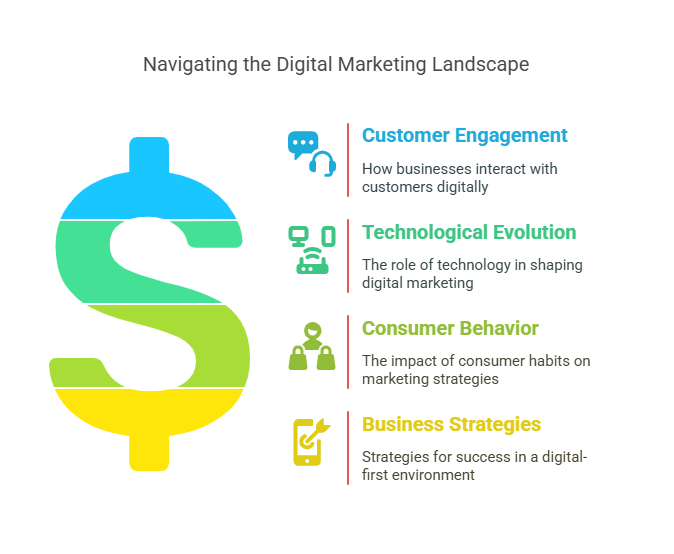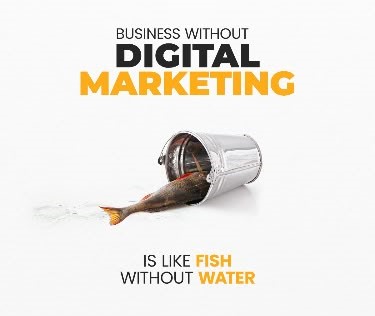Uncategorized
The Evolution and Impact of Digital Marketing
Digital marketing has transformed the way businesses engage with their customers, creating a dynamic landscape that continuously evolves with technology and consumer behavior. This blog explores the various facets of digital marketing, its significance in today’s business world, and the strategies that can help brands thrive in a digital-first environment.

The Beginnings of Digital Marketing
The roots of digital marketing can be traced back to the early days of the internet in the 1990s. With the launch of the first website in 1991 and the introduction of search engines like Yahoo and Google, businesses began to recognize the potential of the internet as a marketing platform. Email marketing emerged as one of the first forms of digital marketing, allowing companies to reach consumers directly in their inboxes.

The Rise of Search Engine Marketing
As search engines became more sophisticated, search engine optimization (SEO) and pay-per-click (PPC) advertising gained prominence. Businesses invested in optimizing their websites to rank higher in search results, leading to increased visibility and traffic. This era marked a significant shift in marketing strategies, as companies began to prioritize online presence and digital advertising.
The Advent of Social Media
As search engines became more sophisticated, search engine optimization (SEO) and pay-per-click (PPC) advertising gained prominence. Businesses invested in optimizing their websites to rank higher in search results, leading to increased visibility and traffic. This era marked a significant shift in marketing strategies, as companies began to prioritize online presence and digital advertising.
Mobile Marketing and the Rise of Smartphones
The introduction of smartphones in the late 2000s further transformed digital marketing. With consumers increasingly accessing the internet on their mobile devices, businesses adapted their strategies to include mobile-friendly websites and apps. Mobile marketing, including SMS campaigns and location-based advertising, became essential for reaching consumers on the go.
The Era of Data and Personalization
As technology advanced, so did the ability to collect and analyze consumer data. Marketers began leveraging big data and analytics to gain insights into consumer behavior, preferences, and trends. This data-driven approach enabled businesses to create personalized marketing campaigns, enhancing customer experiences and driving conversions.
.

The Impact of Digital Marketing on Consumer Behavior
Digital marketing has significantly influenced consumer behavior. With easy access to information, consumers are more informed and empowered than ever before. They can research products, read reviews, and compare prices online before making purchasing decisions. This shift has led to a more competitive landscape, where businesses must continuously innovate to capture consumer attention.


The Future of Digital Marketing
Looking ahead, digital marketing will continue to evolve with advancements in technology. Artificial intelligence, machine learning, and augmented reality are expected to play pivotal roles in shaping future marketing strategies. As consumers become more accustomed to personalized experiences, businesses will need to adapt and leverage these technologies to stay relevant.
Conclusion
The evolution of digital marketing has reshaped the marketing landscape, offering businesses new opportunities to connect with consumers. Its impact on consumer behavior and business strategies is profound, and as technology continues to advance, digital marketing will remain a critical component of successful marketing efforts. Understanding this evolution is essential for businesses aiming to thrive in the digital age.
Current Trends in Digital Marketing
In the ever-evolving landscape of digital marketing, staying updated with the latest trends is crucial for businesses aiming to enhance their online presence and engage effectively with their audience. This blog explores the current trends in digital marketing, highlighting innovative strategies and technologies that are shaping the future of the industry.

1. Personalization at Scale
Personalization has become a cornerstone of effective digital marketing. Brands are leveraging data analytics and AI to create tailored experiences for their customers. By analyzing user behavior and preferences, businesses can deliver personalized content, product recommendations, and targeted ads, enhancing customer satisfaction and loyalty.


2. Video Marketing Dominance
Video content continues to dominate the digital marketing landscape. Platforms like TikTok, Instagram Reels, and YouTube Shorts have popularized short-form video content, making it essential for brands to incorporate video into their marketing strategies. Engaging videos can capture attention quickly and convey messages more effectively than static content.
3. Voice Search Optimization
With the rise of smart speakers and voice-activated devices, optimizing for voice search has become increasingly important. Marketers are focusing on long-tail keywords and natural language to align with how consumers verbally search for information. This trend emphasizes the need for content that answers questions directly and concisely.

Conclusion
The digital marketing landscape is continuously changing, driven by technological advancements and shifting consumer behaviors. By embracing these current trends, businesses can create more effective marketing strategies that resonate with their target audience. Staying ahead of these trends will not only enhance brand visibility but also foster deeper connections with consumers in an increasingly competitive market.

The Power of Digital Marketing: Why Your Business Needs It
In today’s world, where nearly every aspect of our lives has been touched by technology, digital marketing has become a vital part of business success. Whether you are a small startup or a large corporation, embracing digital marketing strategies can provide you with the tools to grow your brand, increase sales, and engage with a global audience.
What is Digital Marketing?
Digital marketing is the umbrella term for all marketing efforts that use an electronic device or the internet. It encompasses a wide range of tactics, including but not limited to:
-
Social Media Marketing: Leveraging platforms like Facebook, Instagram, Twitter, and LinkedIn to engage with your target audience.
-
Content Marketing: Creating valuable, relevant content that attracts, engages, and educates potential customers.
-
Email Marketing: Sending personalized messages and offers to a targeted group of people via email.
-
Search Engine Optimization (SEO): Optimizing your website and content so it ranks higher in search engine results.
-
Pay-Per-Click (PPC) Advertising: Using paid ads to drive traffic to your website.
-
Affiliate Marketing: Partnering with other businesses or influencers to promote your product.


Why Digital Marketing?
1. Cost-Effective
Compared to traditional marketing methods like TV ads or print media, digital marketing can be much more affordable. Social media campaigns, email marketing, and content creation can all be done on a relatively small budget, making it easier for businesses of all sizes to compete.
2. Global Reach
One of the major advantages of digital marketing is the ability to reach a global audience. Whether you’re targeting local customers or looking to expand into international markets, the internet provides the infrastructure to do so.
3. Targeted Advertising
Unlike traditional advertising methods, digital marketing allows you to target your audience more precisely. With tools like Google Ads or Facebook Ads, you can focus your ads on specific demographics such as age, gender, interests, or location, ensuring your content reaches the people most likely to convert into customers.
4. Real-Time Analytics
One of the greatest benefits of digital marketing is the ability to measure results in real time. Using tools like Google Analytics, you can track website traffic, conversions, social media engagement, and much more. This data allows you to tweak your strategies on the fly, improving your chances of success.
5. Increased Engagement
With digital marketing, businesses can engage directly with their audience. Whether it’s responding to comments on a social media post, answering queries through live chat on your website, or collecting feedback through surveys, this direct interaction fosters trust and builds customer loyalty.
Key Digital Marketing Strategies for Success
1. SEO (Search Engine Optimization)
SEO is the practice of optimizing your website so that it ranks higher in search engine results. The goal is to increase organic (non-paid) traffic by appearing on the first page of Google for relevant keywords. It’s crucial to optimize both on-page (content, keywords, meta descriptions) and off-page factors (backlinks, social signals).
2. Social Media Marketing
Social media is one of the most powerful tools in digital marketing. Platforms like Instagram, Facebook, LinkedIn, and Twitter allow businesses to connect with customers, share content, and promote products. The key to success on social media is consistency, valuable content, and audience engagement.
3. Content Marketing
Content marketing is all about creating valuable, relevant, and consistent content to attract and retain a defined audience. This could be blog posts, infographics, videos, podcasts, or case studies. Good content not only drives traffic to your website but also positions your business as an authority in your field.
4. Email Marketing
Email marketing is a great way to keep customers informed, build relationships, and increase sales. By collecting email addresses through your website or social media channels, you can send newsletters, promotional offers, and personalized content directly to your audience. Segmentation and personalization are key to making email marketing effective.
5. PPC Advertising
Pay-Per-Click (PPC) advertising involves paying for ads that appear on search engines or social media platforms. You only pay when someone clicks on your ad, which makes it a cost-effective way to drive targeted traffic. Google Ads and Facebook Ads are two of the most popular platforms for PPC campaigns.

The Future of Digital Marketing
As technology continues to evolve, so does the world of digital marketing. Some of the trends to watch for in the future include:
-
AI and Automation: AI-powered tools are becoming more common in digital marketing, from chatbots for customer service to advanced data analytics that can predict customer behavior.
-
Voice Search: With the rise of voice-activated devices like Alexa and Google Assistant, optimizing for voice search will become increasingly important.
-
Video Marketing: Video continues to be one of the most engaging forms of content, and platforms like YouTube, TikTok, and Instagram Reels are becoming essential for brands to connect with their audience.

Conclusion
In the ever-evolving world of marketing, digital marketing is no longer a choice; it’s a necessity. From small businesses looking to build an online presence to large corporations aiming to strengthen their brand, digital marketing provides the tools and strategies necessary to succeed. The key is to stay informed, embrace new technologies, and always put your audience first.
By integrating a strong digital marketing strategy into your business plan, you’re setting yourself up for growth, visibility, and long-term success. So, if you haven’t already, now is the perfect time to start exploring the endless possibilities digital marketing offers!
